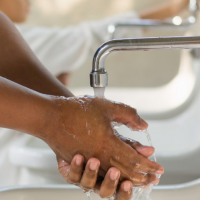
Every year, about 500,000 newborn babies die as a result of infection caused by bacteria. Most of these deaths occur in low- and middle-income countries. Hand hygiene is an inexpensive and a cost?effective method of preventing infection in newborns.
The authors included five studies that involved nurses working in intensive care units of hospitals and all neonates on admission. Four of the studies involved 279 nurses, and the fifth study did not clearly report how many nurses were recruited into the study. Studies compared 'antiseptic detergent' versus alcohol hand rub (sanitiser); 'antiseptic detergent' versus plain soap; 1% triclosan versus 'antiseptic detergent'; and antiseptic that contained iodine versus another (Prepodyne versus betadine).
The review provides no evidence to support the effectiveness of one hand hygiene intervention compared to another for preventing infection in newborns. None of the five included studies examined other important issues such as death and duration of hospital stay. There was not much difference in the undesirable effects of various hand hygiene interventions on the skin of caregivers.
In conclusion, the review authors are not sure of the hand hygiene intervention that is better for preventing infection in newborn babies. They assessed only a few studies that involved small numbers of nurses and babies. In addition, most of the studies assessed had high risk of bias. Larger studies with low risk of bias are needed so reliable conclusions can be reached.
They have no confidence in the available evidence to draw conclusions about the effectiveness of these hand hygiene interventions for preventing infection in newborns. Read the review
